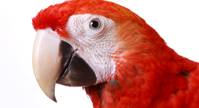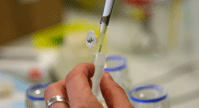Equine Genetic Disease Testing
Why Should I Test My Horse?
Many of the genetic disorders found in horses have a recessive mode of inheritance. This means a horse can be a carrier of the mutated gene but not be affected by it. A carrier is heterozygous for the disease gene, meaning it has one copy of the mutation, but will not exhibit any symptoms. It is only when a horse inherits two copies of the mutated gene that it is affected by the associated disorder. When two carriers of a recessive disorder are bred, they have a 25% chance of producing an affected foal.
For disorders that are inherited as incomplete dominant, the symptoms associated with the disease can vary if the horse has one or two copies. Knowing if a horse has one or two copies of the HYPP or PSSM1 genes can help owners make informed decisions about breeding and dietary selections for an affected horse.
A dominant disorder like Malignant Hyperthermia may cause the horse to only exhibit symptoms when subjected to anaesthesia or other conditions. It can be important to know the status of a horse prior surgery or before initiating new training regimens.
| Equine Test Type - Quarter Horses & Related Breeds | Mode of Inheritance |
|---|---|
| Glycogen Branching Enzyme Deficiency (GBED) | Recessive |
| Hereditary Equine Regional Dermal Asthenia (HERDA) | Recessive |
| Hyperkalemic Periodic Paralysis Disease (HYPP) | Incomplete Dominant |
| Malignant Hyperthermia (MH) | Dominant |
| Polysaccharide Storage Myopathy - Type 1 (PSSM1) | Incomplete Dominant |
| Equine Test Type - Other Breeds | Mode of Inheritance |
|---|---|
| Polysaccharide Storage Myopathy - Type 1 (PSSM1)
*Found in most breeds |
Incomplete Dominant |
| Junctional Epidermolysis Bullosa
JEB1 - Belgian Draft Horse and Related Breeds Only JEB2 - American Saddlebred Only |
Recessive |
| Cerebellar Abiotrophy (CA) *Arabian Horse and Related Breeds |
Recessive |
| Lavender Foal Syndrome (LFS) *Arabian Horse (primarily Egyptian Arabian) |
Recessive |
| Severe Combined Immunodeficiency (SCID) *Arabian Horse |
Recessive |
| Foal Immunodeficiency Syndrome (FIS) *Arabian Horse |
Recessive |
| Hoof Wall Separation Disease (HWSD) *Connemara Ponies |
Recessive |
| Warmblood Fragile Foal Syndrome (WFFS) *Warmblood Horses |
Recessive |
| Hydrocephalus - Friesian Horses *Warmblood, Draft Horses |
Recessive |
| Dwarfism - Friesian Horse *Warmblood, Draft Horses |
Recessive |
| Squamous Cell Carcinoma (SCC) *Haflinger and Belgian breed Horses |
Recessive |
Some genetic disorders are associated with a pattern, such as Frame Overo, Splash White 2 and Splash White 3 and Leopard Print. Because several of the Overo patterns appear similar, it can be important to properly distinguish which pattern a horse has prior to breeding. This can prevent producing an affected foal.
| Equine Test Type - Pattern Associated Tests | Disease Mode of Inheritance |
|---|---|
| Lethal White Overo (LWO) | Recessive- Homozygous Lethal |
| Splashed White Overo 2 & 3 | Recessive- Homozygous Lethal |
| Congenital Stationary Night Blindness (CSNB) | Recessive |
| Equi ne Panel Tests | Breed |
|---|---|
| 6 Panel Test Includes (GBED, HERDA, HYPP, IMM, MH, PSSM) | Quarter Horse and related breeds |
| 3 Panel Test (CA, LFS, OAAM1, SCID) | Arabian Horse and related breeds |
Submit a Sample for Testing:
To submit a sample for testing please click on ORDER and download a sample submission form. Then follow the sample collection and submission instructions.
Please see our fee schedules below for bulk and combination rates.










